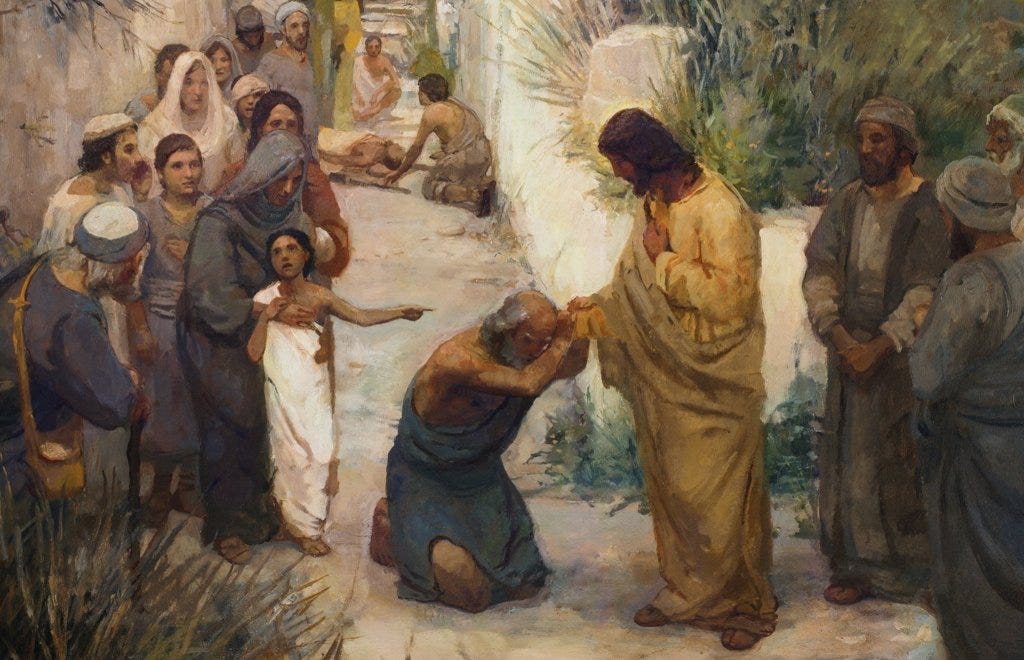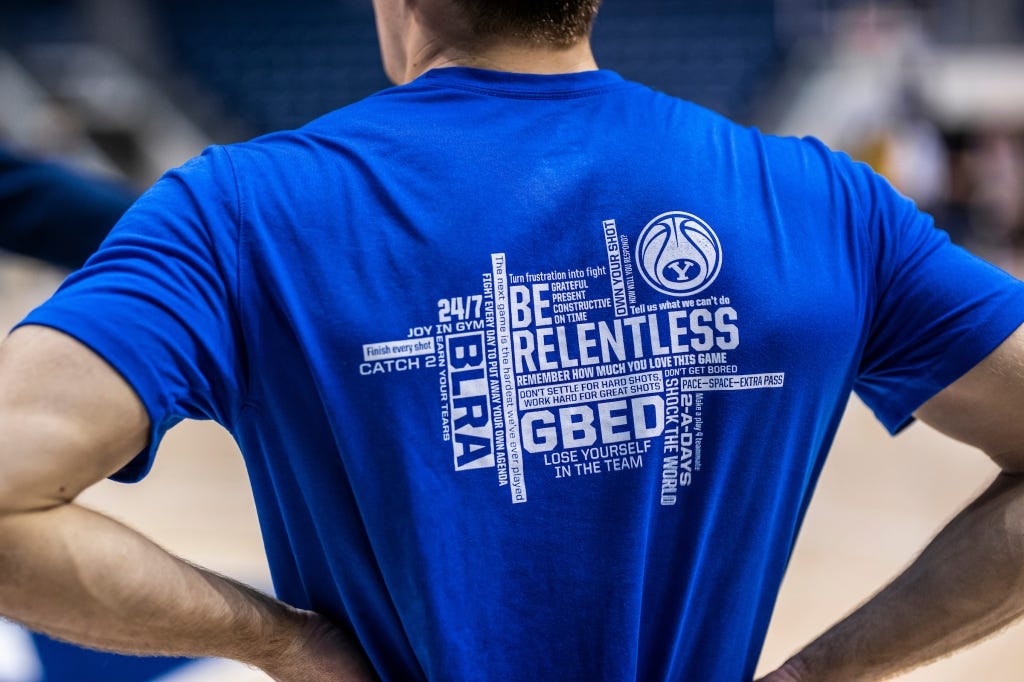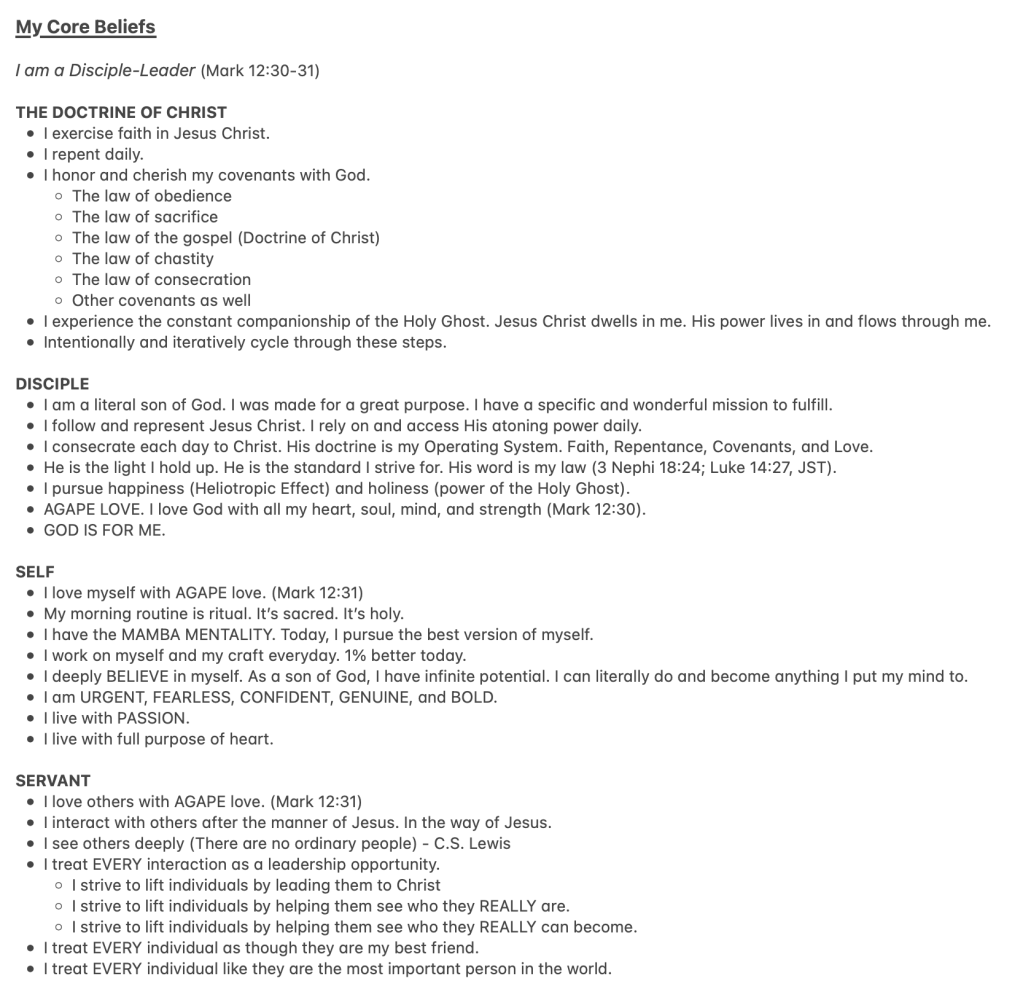The Disciple-Leader Newsletter #43 // November 18, 2023.
Discipleship. Leadership. Mental Performance.
DISCIPLESHIP
"At my age, I have attended many funerals. I am sure many of you have noticed what I have noticed. When celebrating the life of a deceased family member or a friend, it is rare for the speaker to talk about the size of the person’s home, the number of cars, or the bank account balances. They usually don’t speak about social media posts. At most of the funerals that I have attended, they focus on their loved one’s relationships, service to others, life lessons and experiences, and their love for Jesus Christ. Don’t misunderstand me. I’m not saying that having a nice home or a nice car is wrong or that using social media is bad. What I am saying is that in the end, those things matter very little compared to loving the Savior."
M. Russell Ballard
M. Russell Ballard, a modern prophet said what Alma, an ancient prophet said using different words. "For behold, I say unto you there be many things to come; and behold, there is one thing which is of more importance than they all—for behold, the time is not far distant that the Redeemer liveth and cometh among his people" (Alma 7:7).
Nothing is more important than Jesus Christ. Nothing we do, say, or think about should ever take higher priority than loving Him. That is what's most important.
In honor of his passing away this week, I share one of his all-time favorite quotes. It's also one of mine. These words, cherished and embodied by M. Russell Ballard, were spoken by his grandfather Melvin J. Ballard.
“(One) night I received a wonderful manifestation and impression which has never left me. I was carried to this place —into this room. I saw myself here with you. I was told there was another privilege that was to be mine; and I was led into a room where I was informed I was to meet someone. As I entered the room I saw, seated on a raised platform, the most glorious being I have ever conceived of, and was taken forward to be introduced to Him. As I approached He smiled, called my name, and stretched out His hands towards me. … He put His arms around me and kissed me, as He took me into His bosom, and He blessed me until my whole being was thrilled. As He finished I fell at His feet, and there saw the marks of the nails; and as I kissed them, with deep joy swelling through my whole being, I felt that I was in heaven indeed. The feeling that came to my heart then was: Oh! If I could live worthy … so that in the end when I have finished I could go into His presence and receive the feeling that I then had in His presence, I would give everything that I am and ever hope to be!” (Melvin R. Ballard, Melvin J. Ballard: Crusader for Righteousness [1966], 65–66).
Would you?
LEADERSHIP
"Effective leaders work to connect with (others). Why? Because once we connect, we build a bridge of relationship that can bear the weight of hard truth. We earn our right to genuinely influence them.”
Tim Elmore
Has a coach ever identified something you weren't good at? Has your spouse ever explained to you how you weren't showing up in a certain area like he/she needs you to? Or maybe a friend informs you of a personal weakness you have that's affecting others. How do you feel during these moments?
Leadership has been defined by a couple of scholars as "helping others accomplish a goal or to become someone they wouldn't be able to otherwise." Inherent in this conception of leadership is the idea that a leader is most interested in inspiring positive change in others. Change is not easy. When one attempts to change, resistance always presents itself. And unless that resistance is combatted with hard truths, resistance prevails.
Hard truths are heavy. Even when received by a trusted source, it can weigh you down. When delivered by someone who hasn’t earned the right to influence you—accurate or not—their suggestions most likely fall on closed minds. These words of John Stott are important to remember: "Our love grows soft if it is not strengthened by truth, and our truth grows hard if it is not softened by love."
Leadership is relational. The stronger the relationship, the greater the capacity the recipient has for feedback. A relationship here doesn’t necessarily mean friendship either. Your greatest coaches, teachers, or leaders might not always be your friends. Rather, relational strength is built by desiring and acting in their best interest. Trust is built brick by selfless brick. Trust is drained drip by selfish drip. The old cliche is true: People don’t care how much you know unless they know how much you care. Do you know exactly what your child needs but are having a hard time keeping their attention? Do you know the antidote to your friends' suffering but they won't seem to listen? Then care more. Care is reciprocal. Prove to them that you care about what they care about. You'll find that they'll care about what you care about.
This is how you earn the right to influence them. This is how you open minds and hearts to hard and necessary truths.
MENTAL PERFORMANCE
"Think about the following questions: What values drive your actions? Who has qualities that align with yours, and what are they? What makes you feel that you’re performing at your best? How do you want to live your life? Write down your answers, and look for what they have in common. Use the words that stand out to you to come up with your personal philosophy. Then commit to living by it."
Michael Gervais
During his introductory press conference, BYU men’s basketball coach Mark Pope was asked, “What are realistic expectations in your first year as head coach?”
His response: “I don’t deal in realistic expectations.”
That BYU team ended up being projected as a 5 seed in the infamous NCAA tournament which never happened due to COVID. Multiple analysts predicted a final-four appearance for that team. ESPN's simulation even placed BYU in the National Championship game.
Pope’s statement is one among many that the BYU basketball team lives by. BYU has a “Word Wall” — an actual wall in their facility with 26 different words or phrases on it. These words are also printed on the back of their team shirts. Everyone in the organization is constantly stimulated with these words.
The New York Jets do a similar thing, except they only have 1 team mantra: All Gas No Brake. Wherever you go in the facility, you see that messaging. Whenever you are in a meeting, you hear that messaging. They've designed their facility as a constant reminder of their core message. It is constantly in the forefront of their mind.
It’s worth considering, if organizations at the highest levels of professional and intercollegiate competition have such a laser focus on drilling a core message into their team's minds to lift their performance, why wouldn’t you do the same for yourself?
Just like organizations and teams have a culture or a mantra, you need to have a personal culture. A personal culture will be like BYU’s word wall. It’ll include statements that represent who you are, what you believe, and how you want others to experience you.
As an example, here is a portion of my personal culture.
If you don’t have a written, personal culture, create one! Once it’s written on paper, inscribe it on your mind (memorize it), then write it on the fleshy tables of your heart by living those ideals.
A personal culture acts as a filter for your thoughts, decisions, and life in general. You can measure everything you think and do against your personal culture. In other words, you choose your culture and your culture chooses your thoughts and actions. If a thought or action is in alignment with your culture, you've got a green light. If it's out of alignment, your choice is already made.
Its length will depend on your personality. I like mine longer. So does BYU. The NY Jets like it short and sweet. More important than length is your commitment to the standards you decide on. Finally, here are a few general principles about your personal culture:
Your personal culture sets the tone for what you believe, how you behave, and the experience your behavior produces for others.
Everyone has a personal culture. If you haven't clearly articulated and specified yours, you might not think you have one. But you do. Whether by design or default, we all have one. Design yours.
There is a mutually reinforcing process between your culture and your behavior. Your culture informs your behavior. Your behavior reinforces your culture.
Someone has said, "There is a profound difference between a concept in your head and a belief on your heart. When a belief is truly core, when it is fully and completely on your heart, then it will drive everything you do. You will respond in alignment with that belief no matter the event or situation. But if it is simply a concept in your head, if it is just a quote you find inspiring, then it will not consistently drive your actions. Especially not in response to difficult, challenging situations. Culture is what leads when no one is watching."
Your culture has to be on your mind constantly. Create an environment for yourself where you are able to think about it and be reminded of it often.
Disciple-Leadership: Jesus-led. Lead like Jesus.









